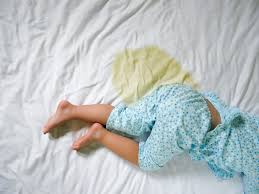Bedwetting in children. What are the causes and prevention?

Bedwetting is not uncommon among children. Soggy sheets and wet pajamas are a familiar scenario that you may notice in many children when they wake up. If your child wets the bed, it doesn’t mean that your toilet training is wasted. It’s often just a normal part of a child’s development. Bedwetting is something that many children experience, but there are ways to help your child stay dry all night.
What is bedwetting?
Bedwetting is also called night time incontinence or nocturnal enuresis. Enuresis is the inability to control urination. It is the act of urinating while sleeping after a certain age. Parents need to understand that bedwetting is involuntary. Your child loses control over her bladder and ends up peeing accidentally. Generally, children who wet their bed below the age of 6 are not a concern as the child is still learning bladder control. However, if the bedwetting continues, you can treat this problem with patience.

What are the causes of bedwetting?
Why your child wets the bed may not be entirely understood, but there are numerous reasons and, one of these is likely to be the reason for them to wake up with soggy sheets –
Hereditary : Children who wet the bed tend to have a parent, aunt, or uncle who wet the bed until the age of 10. They eventually grow out of this practice.
Nightmares : Children often get mortified watching horror movies or nerve-wracking videos. They control their bladders in fear of ghosts and monsters being in their presence. And this leads to wetting the bed due to fear.
Drinking too much water before going to sleep: When your bladder is full, it could take only about 10 to 15 minutes for you to pee after drinking water. If you are dehydrated, it could take between one hour and two hours for you to urinate. If your child drinks lots of water just before going to bed, she will end up peeing in the middle of the night.
Inability to recognize a full bladder: If your child is a deep sleeper, a full bladder may not wake your child. She is not likely to understand the surroundings and may end up with wet pajamas.
Hormonal imbalance : ADH has an anti-diuretic action that prevents the production of dilute urine. During childhood, some kids don’t produce enough anti-diuretic hormone (ADH) that slows the secretion of urine during night time. It results in the imbalance of hormones in your child’s body.
Medical conditions : Underlying medical conditions like constipation, urinary tract infection (UTI), or diabetes may be the cause of bedwetting in your child. However, if your child suffers from any of these conditions, make sure to consult your pediatrician.

What steps can I take to prevent my child from wetting the bed?
Help your child follow a toilet routine : Make sure your child makes frequent visits to the washroom. Set a goal for your child to visit the toilet during the night to prevent them from wetting the bed. You can also make sure that your little one uses the washroom before she goes to sleep.
Keep an eye on your child’s fluid intake : Hydration is vital in growing children. It is a myth that reducing the intake of fluids in children will make it less likely that she might wet the bed. Parents need to make sure that their children consume enough liquids throughout the day. You can encourage them to drink more fluids during the mornings and afternoons. Similarly, reduce the intake of fluids during the night. This practice might help your child reduce the chances of wetting the bed.
Restrict the intake of caffeine- : Caffeine is a stimulant present in coffee, tea, soda, and chocolate. If you consume large amounts of caffeine, you’ll probably need to urinate more often. Parents need to make sure not to allow their children to consume caffeinated drinks since they can increase urination frequency.
Reward your child: Draw a chart to keep track of the dry and wet nights. Reward your child with stickers or chocolates when they don’t wet the bed. It increases the confidence in your child and will help make an effort to follow the toilet routine without fail.
Talk to your child
Parents need to talk to their children and tell them not to be embarrassed about wetting the bed. If she gets upset or ashamed, remind her that it is not a big deal. Share your experiences when you were a child to make your little one feel less lonely. This way, you can boost your child’s confidence.
Consult a doctor : Bedwetting may be a sign of an underlying condition that needs medical attention. Consult your paediatrician if your child continues to wet the bed after the age of 10 or if bedwetting causes unusual thirst, red urine, hard stools, or painful urination.
Although frustrating, bedwetting without a physical cause doesn’t pose any health risks. Children tend to feel sad quickly when they feel that they have done something unusual. Though this may be embarrassing for your child during any social event, you need to hold their hand and let them know accidents can happen. And it doesn’t matter what the other children say. All you have to do is stay patient and never give up on your child. Stay beside them and let them know it’s going to get better. Maybe even give them a tight hug and let them know how much you love them.
Jumpstart Preschool




